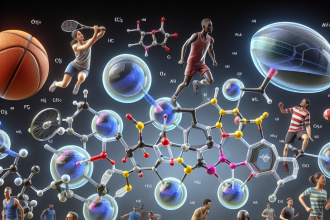-
Table of Contents
Parabolan: Controversies and Ethical Implications in Sports
Sports and performance-enhancing drugs (PEDs) have always been intertwined, with athletes constantly seeking ways to gain an edge over their competition. One such PED that has been at the center of controversy and ethical debates in the world of sports is Parabolan. This anabolic steroid, also known as Trenbolone, has gained popularity among bodybuilders and athletes for its ability to increase muscle mass and strength. However, its use has raised concerns about fairness, health risks, and the integrity of sports. In this article, we will delve into the controversies surrounding Parabolan and its ethical implications in sports.
The Rise of Parabolan in Sports
Parabolan was first introduced in the 1960s as a veterinary drug for cattle to promote muscle growth and increase feed efficiency. However, it soon caught the attention of bodybuilders and athletes due to its potent anabolic effects. It was initially used in the underground market, but with the rise of the internet, it has become more accessible and widely used.
Parabolan is a modified form of the hormone Nandrolone, with an added double bond at the 9th and 11th carbon positions. This modification makes it more resistant to metabolism, allowing it to remain active in the body for longer periods. It also has a high binding affinity to the androgen receptor, making it more potent than testosterone in promoting muscle growth and strength.
Due to its anabolic properties, Parabolan has been used by athletes in various sports, including bodybuilding, powerlifting, and track and field. It is believed to enhance performance by increasing muscle mass, strength, and endurance. However, its use has been banned by most sports organizations, including the International Olympic Committee (IOC) and the World Anti-Doping Agency (WADA).
Controversies Surrounding Parabolan
The use of Parabolan in sports has been met with numerous controversies, with many questioning its fairness and safety. One of the main concerns is that it gives athletes an unfair advantage over their competitors. The use of PEDs goes against the principles of fair play and undermines the integrity of sports. It also creates an uneven playing field, where those who can afford and access these drugs have an advantage over those who cannot.
Moreover, the use of Parabolan has been linked to numerous health risks. Like other anabolic steroids, it can cause adverse effects such as liver damage, cardiovascular problems, and hormonal imbalances. It can also lead to psychological effects, including aggression, mood swings, and dependency. These risks are heightened when Parabolan is used in high doses or for prolonged periods, as is often the case in sports.
Another controversy surrounding Parabolan is its detection in drug tests. While it is a banned substance, it can be challenging to detect in standard drug tests. This is because it is rapidly metabolized and excreted from the body, making it difficult to detect within the short window of time that most drug tests cover. This has led to debates about the effectiveness of drug testing in sports and the need for more advanced testing methods.
Ethical Implications of Parabolan in Sports
The use of Parabolan in sports raises several ethical concerns, including the violation of the spirit of sportsmanship, the health and safety of athletes, and the integrity of sports. It also raises questions about the responsibility of sports organizations and governing bodies in ensuring fair and clean competition.
One of the main ethical implications of Parabolan use in sports is the violation of the spirit of sportsmanship. Sports are meant to be a test of an athlete’s natural abilities and hard work, not their access to performance-enhancing drugs. The use of PEDs goes against the principles of fair play and undermines the integrity of sports. It also sets a bad example for young athletes and sends the message that cheating is acceptable as long as you can get away with it.
The health and safety of athletes are also at stake when it comes to the use of Parabolan. As mentioned earlier, it can cause numerous adverse effects, some of which can be life-threatening. Athletes who use Parabolan are not only putting their health at risk but also the health of their competitors. This raises questions about the responsibility of sports organizations in protecting the well-being of their athletes.
Moreover, the use of Parabolan in sports raises concerns about the integrity of sports. The use of PEDs undermines the credibility of sports and casts doubt on the achievements of athletes. It also creates a culture of cheating and dishonesty, which goes against the values that sports are meant to promote.
Expert Opinion
According to a study by Yesalis et al. (2015), the use of anabolic steroids, including Parabolan, is widespread among athletes, with an estimated 3 million Americans using them. This highlights the need for stricter regulations and education on the dangers of PEDs in sports. Dr. John Hoberman, a leading expert on the history of doping in sports, believes that the use of PEDs in sports is a societal problem that requires a multi-faceted approach to address. He suggests that education, stricter regulations, and more advanced drug testing methods are necessary to combat the use of PEDs in sports.
Conclusion
The use of Parabolan in sports has been met with numerous controversies and ethical implications. Its ability to enhance performance has made it a popular choice among athletes, despite its banned status. However, its use raises concerns about fairness, health risks, and the integrity of sports. It is essential for sports organizations and governing bodies to take a stand against the use of PEDs and implement stricter regulations and education programs to protect the integrity of sports and the well-being of athletes.
References
Yesalis, C. E., Bahrke, M. S., & Wright, J. E. (2015). History of doping in sport. In Performance-Enhancing Substances in Sport and Exercise (pp. 3-20). Human Kinetics.




